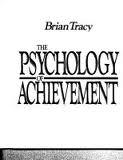Positive reinforcement and specifically superior human relations is critical to employee engagement and achieving higher performance from your people. Don’t forget Jim Collins corollary in Good to Great, “First Who Then What!”
We’ve discussed previously in these blogs on  The Psychology of Achievement how to make others feel important, here’s a final addition to help you with raising your own self-esteem, as well as those around you and their performance.
The Psychology of Achievement how to make others feel important, here’s a final addition to help you with raising your own self-esteem, as well as those around you and their performance.
Attention
The more attention we pay to others the more we convey to them in a way that cannot be conveyed any other way that we consider them to be valuable and important. This is a condition of the quality of our attention. As human beings we pay attention to what we value and ignore what we don’t.
Remember the last time someone ignored you. In most cases we become angry at their rudeness, we are offended, irritated.
How do we pay attention? Simple, by listening.
The Creator gave us two ears and one mouth, and this is possibly the best proportion to remember to use them in. Always listen twice as much as you speak. By listening to people we convey to them we feel they are important and valuable.
Intent Listening
- 1. Builds trust between two parties
- Builds character in the listener – here’s that word again – it takes self-discipline. I first learned this in radio advertising, our minds function at about 450-500 words/minute. The average person speaks at about 100-150/words a minute. What does that mean? We have the ability to think about things 2/3’s of the time the other person is talking. In radio this meant we would work to get more than 150 works in a 60 second commercial. Because we knew the mind could absorb more, and frequently a fast paced ad generated more listening since it was upbeat. The point here is if we do not consciously concentrate on what someone is saying, we will find ourselves thinking about something else and miss the complete point of what they are saying
- Listening Builds Self-esteem in the person listened to. The more we listen the more valuable they feel about themselves. Imagine a thermometer on a hot summer day! Consequently the more we listen the more they will like us as well.
Effective Listening
- 1. Listen Attentively: How do you accomplish this? Face the person squarely, lean forward and concentrate 100% totally without mental wandering, distraction, or interruption.
- 2. Pause before replying: This is often perceived as classy. When you pause before you reply, you first make sure the person isn’t just pausing to take a breath. Secondly it conveys to the person that you are giving careful consideration to what they’re saying. Third when you pause before speaking you will hear what the person is saying for the better than if you immediately speak when the person stops.
- 3. Feed it back: This makes sure you get what they are saying perfectly clear. Repeat it. …So what I understand is… Let me make sure I have this clear… This conveys that you are listening intently and value the communication and only then respond.
Ask, “How do you mean?” Many people say things that are unclear even to themselves.
- 4. Ask Questions: The best questions are open ended here; ask what, where, when, who, how, which and why. Accept full responsibility for the communication.
Boomerang
Whatever genuine emotion we express toward any other person boomerangs back on us with redoubled force. Anything we say directly or indirectly is going to come back to us, and always with double the force that it was sent with.
The boomerang always starts in our hand.
“The fragrance of the rose lingers longest on the hand that cast it.” –Ghandi
Be very sure that what you cast at other people has a fragrance that you want to linger on your own hands.
How many of these principles are you applying? I’m constantly trying to remember to pause before replying and then to feed it back to someone when they speak to me. It seems we are in such a hurry these days that this simple courtesy escapes us. Many arguments and disagreements could be avoided simply by following the principles listed here in Intent and Effective Listening. "How do you mean?" is a wonderful question if there is at all any ambiguity in the person’s message or in your understanding it.
Here’s a suggestion. If you manage/lead people, or you simply want to improve your relationship with your spouse, friends or children, post these ideas on your desk somewhere so you can review them frequently. The only way to remember to use them is to practice them. Next time you fail to you misunderstand or get into an argument with someone because you didn’t follow these rules, take them out and try to figure out which one might have helped you communicate better.






.jpeg?width=150&height=135&name=Hand%20with%20marker%20writing%20the%20question%20Whats%20Next_%20(1).jpeg)

